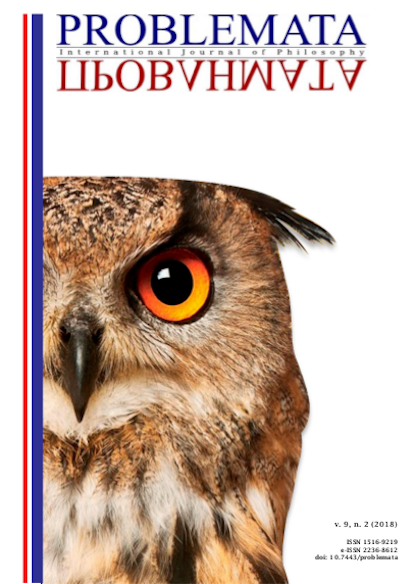ROUSSEAU: REVOLUTION DEFENDER?
DOI:
https://doi.org/10.7443/problemata.v9i2.37739Keywords:
Revolution, French Revolution, Revolutionary, Rousseau.Abstract
The purpose of this article is to make an introductory reflection on the issue of the revolution in Rousseau's writings. The theme of the revolution became important subject for the scholars of Rousseau's thought, especially after the French revolutionaries affirmed that they were inspired by the Philosopher's ideas in their actions, taking their work of the social contract as if it were an invitation to the creation of a new political and social order. In this sense the reflection that is proposed in this article seeks to clarify, even if it is in an introductory way, Rousseau's real stance on the issue of the revolution.
Downloads
References
BACHOFEN, Blaise. Why Rousseau mistrusts revolutions: Rousseau’s paradoxical conservatism. In: LAURITSEN, Holger and THORUP, Mikkel. Rousseau and revolution. London: Continuum, 2011.
BACZKO, Bronislaw. Rousseau: solitude et communauté. Trad. Claire Brendhel-Lamhout. Paris: École Pratique des Hautes Études et Mouton & Co, 1974.
BORGES, Bento Itamar. Crítica e teorias da crise. Porto Alegre: EDIPUCRS, 2004.
BOULANGER, Philippe. Le souverainisme. Une idée certaine de la France: essai sur le crépuscule des Anciens. Paris: Edition du Cygne, 2008.
BOURG, Julian. Rousseau and the terror: a reassessment. In: LAURITSEN, Holger and THORUP, Mikkel. Rousseau and revolution. London: Continuum, 2011.
CASSIRER, Ernst. A questão Jean-Jacques Rousseau. Tard. Erlon José Paschoal. São Paulo: Editora UNESP, 1999.
FARR, James & WILLIAMS, David Lay. Editors’introduction. In: FARR, James & WILLIAMS, David Lay (Eds.). The general will: the evolution of a concept. New York: Cambridge University Press, 2015.
GIANNETTI, Eduardo. Vícios privados, benefícios públicos?: a ética na riqueza das nações. São Paulo: Companhia das Letras, 1993.
HICKS, Stephen. Explaining postmodernism: skepticism and socialism from Rousseau to Foucault. Arizona: Scholargy Publishing, 2004.
MICKLETHWAIT, John, WOOLDRIDGE, Adrian. A quarta revolução: a corrida global para reinventar o Estado. Trad. Afonso Celso da Cunha Serra. São Paulo: Penguin Portfolio, 2015.
NEIMAN, Susan. O mal no pensamento moderno: uma história alternativa da filosofia. Trad. Fernanda Abreu. Rio de Janeiro: DIFEL, 2003.
PHILONENKO, Alexis. O contrato social. In: CHATELET, François, et al., (Org.). Dicionário das obras políticas. Trad. Glória de C. Lins; Manoel Ferreira Paulino. Rio de Janeiro: Civilização Brasileira, 1993.
RASMUSSEN, Dennis. The problems and promise of commercial society: Adam Smith’s response to Rousseau. Pennsylvania: The Pennsylvania State University Press, 2008.
ROUSSEAU, Jean-Jacques. Do contrato social. Trad. Lourdes Santos Machado. São Paulo: Abril Cultural, 1983a (Os Pensadores).
______. Emílio ou da educação. Trad. Sérgio Milliet. Rio de Janeiro: Bertrand Brasil, 1995.
______. Discursos sobre as ciências e as artes. Trad. Lourdes Santos Machado. São Paulo: Abril Cultural, 1983b (Os Pensadores).
______. Discurso sobre a origem e os fundamentos da desigualdade entre os homens. Trad. Lourdes Santos Machado. São Paulo: Abril Cultural, 1983c (Os Pensadores).
______. Confissões. Trad. Fernando Lopes Graça. Lisboa: Portugália, 1964.
STAROBINSKI, Jean. Jean-Jacques Rousseau: a transparência e o obstáculo. Trad. Maria Lúcia Machado. São Paulo: companhia das Letras, 2011.
TALMON, Jacob. The rise of totalitarian democracy. Boston: Beacon Press, 1952.
TODOROV, Tzvetan. Jardim imperfeito: o pensamento humanista na França. Trad. Mary Amazonas Leite de Barros. Sao Paulo: Editora da Universidade de São Paulo, 2005.
VIROLI, Maurizio. Jean-Jacques Rousseau and the “well – ordered society. Translated by Derek Hanson. Cambridge: Cambridge University Press, 1988.
WOKLER, Robert. Rousseau: a very short introduction. New York: Oxford University Press, 2001.
WRAIGHT. Christopher. Rousseau’s The Social Contract: a reader’s guide. London: Continunm, 2008.
ZSCHIRNT, Christiane. Livros: tudo o que você não pode deixar de ler. Trad. Claudia Aberling. São Paulo: Globo, 2006.
Downloads
Published
Issue
Section
License
Authors who publish with this journal agree to the following terms:
- Authors retain copyright and grant the journal right of first publication with the work simultaneously licensed under a Creative Commons Attribution License that allows others to share the work with an acknowledgement of the work's authorship and initial publication in this journal.
- Authors are able to enter into separate, additional contractual arrangements for the non-exclusive distribution of the journal's published version of the work (e.g., post it to an institutional repository or publish it in a book), with an acknowledgement of its initial publication in this journal.
-
- Authors are permitted and encouraged to post their work online (e.g., in institutional repositories or on their website) prior to and during the submission process, as it can lead to productive exchanges, as well as earlier and greater citation of published work (See The Effect of Open Access).





